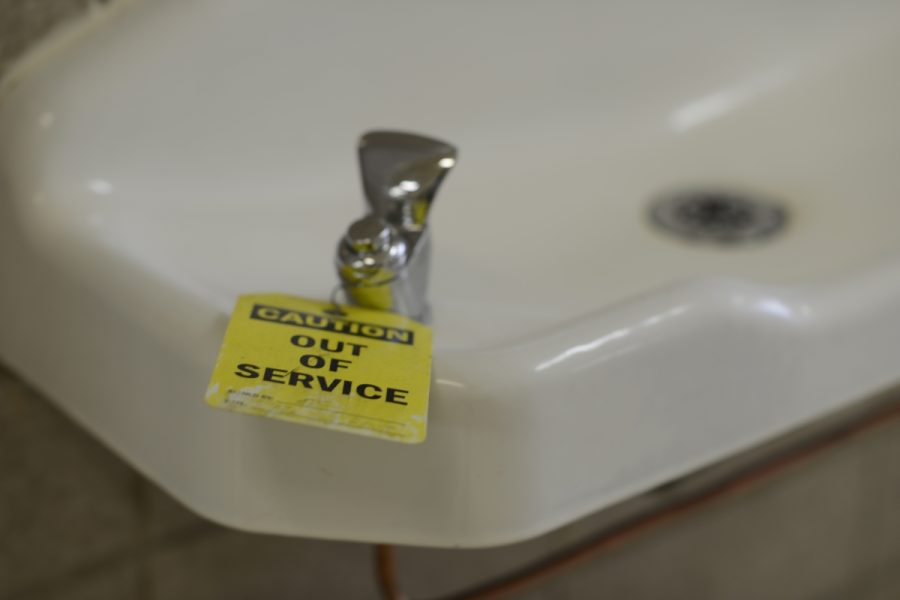Down to the Last Drop
The Water Crisis in Cape Town, South Africa
A water fountain with no running water symbolizes the future plight of residents of Cape Town, South Africa.
You just came home from practice, but no water will come out of the shower head. You want to make some mac ‘n cheese, but there’s no water to boil. You want to cool off with a swim after a long day but all of the pools have been drained. This is soon to be reality for residents of Cape Town, South Africa, when the plumbing is expected to shut off on ‘Day Zero,’ a date now set for April or May of 2019. After that, residents will need to go to water collection points to receive twenty-five liters (about six gallons) of water a day. Considering the average American uses 80-100 gallons of water a day, this amount is meager.
Several factors have contributed to this impending crisis. Three consecutive years of drought combined with a 30% population increase since 2000 have severely depleted reservoirs. When the ominous Day Zero arrives, Cape Town will become the first major city in the world to not have running water 一 one of the most drastic effects of climate change to date. Climate scientists say that if climate change is not addressed, water crises like this one will become much more frequent. Other cities in danger of water crises include São Paulo (Brazil), Bangalore (India), and Beijing (China).
Another cause of the looming emergency is, ironically, Cape Town’s impeccable water management, a process that includes reducing water demand and fixing leaky pipes to minimize water waste. In 2014, Cape Town won an Adaptation Implementation award for it. Because of this award, the leaders of Cape Town did not feel the need to look for water sources beyond the six reservoirs that are currently used. Now, as the city dries up, this decision is being looked upon with regret.
“I am appalled by the fact that Cape Town is in such a bad situation.”
Day Zero was originally set for mid-April of this year, with the date changing every few weeks. However, after rainfall on February 11, 2018, the day was delayed nearly a month. On March 7, 2018, officials declared that Day Zero had been postponed until next year, thanks to the citizens of Cape Town doubling down on water conservation efforts.
When the danger of Day Zero was more immediate, the South African government made preparations. Because shutting off the water can lead to sanitary issues and water scarcity may lead to violence, the South African army was on standby to support Cape Town law enforcement. Law enforcement officials continue to issue tickets for failing to adhere to water rationing and usage laws. Many residents have drastically changed their daily routines to conserve water.
“My grandparents live in Cape Town and now have to limit their water use even when showering. They can only have the water running to get wet and to wash off soap and shampoo. To prepare for ‘Day Zero,’ they bought a bunch of five gallon containers of water,” Zachary Cohen ’19 said.
As much as this issue has major implications for climate change, health, and security, it does not receive as much news media attention as President Trump’s frequent dark-of-the-night tweet frenzies. Consequently, the issue is not as well-known.
“This is actually horrific. American news is often centered on Europe and the United States, so I’m not surprised about the lack of coverage, but I am appalled by the fact that Cape Town is in such a bad situation,” Sofia Burton ’18 said.
While many are anxiously watching the situation, the question of ‘what can be done?’ is being asked.
“Personally, I do think that this is tragic, but I don’t know what there is that we can do besides give publicity to the problem,” Cohen said.
Until the rainy season arrives in June, which is when the Southern Hemisphere’s winter begins, little can be done to replenish Cape Town’s reservoirs. Instead, jugs full of water have been transported to Cape Town from other South African cities, thanks to the efforts of several charities and grassroot donation movements that have decided to spread awareness when news media would not. Because of social media, this movement has gained traction, and thousands of liters of water are being donated from countries all over the world, including the United States.
This crisis is alarming for many reasons. The best thing that can be done to minimize the frequency and harshness of water crises is to do our part in addressing climate change. Turn off the water when you’re brushing your teeth. Put empty water bottles in the proper recycling bins. Take public transportation instead of driving everywhere. These may seem like small actions, but over time, they make a big difference.
Sinaia Keith Lang is a Managing, Advisory, and Copy Editor for ‘The Science Survey’ newspaper and an Editor-in-Chief of ‘The Observatory’ yearbook....
Anastasia Koutavas is an Editor-in-Chief for ‘The Science Survey,’ as well as a Student Life Reporter for ‘The Observatory.’ Koutavas believes...

